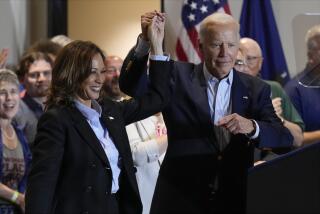Trump and Biden wage a big battle over one electoral vote in rural Maine
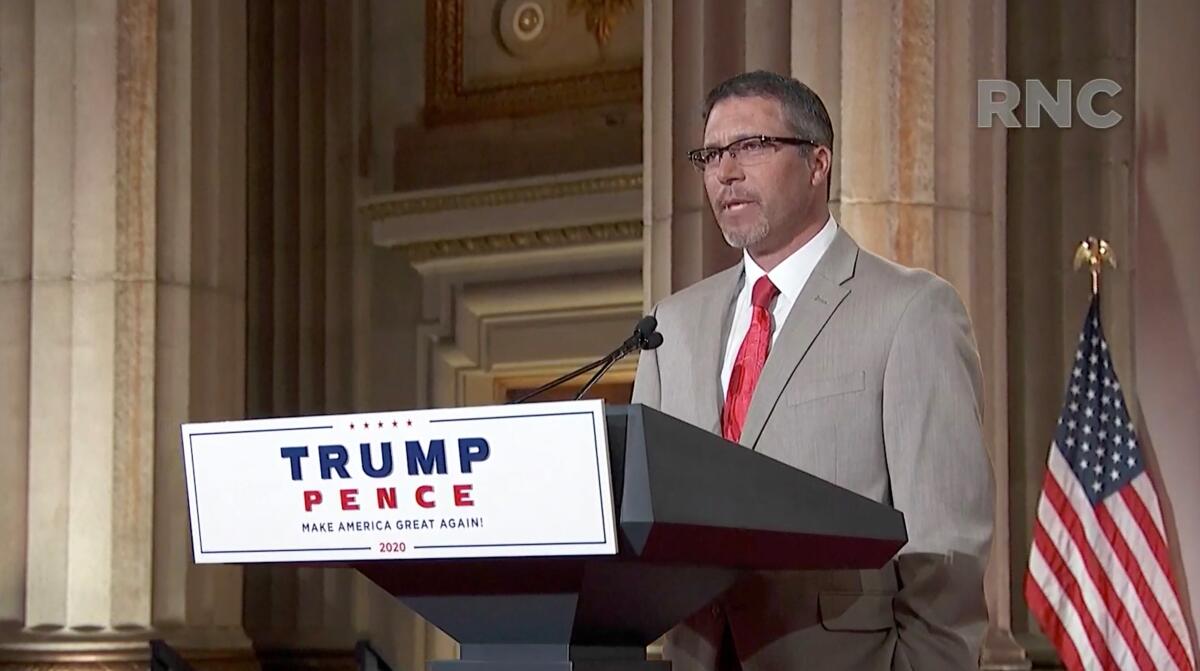
- Share via
BANGOR, Maine — Maine is getting an outsized share of Trump love these days.
The president visited a remote town of 1,500 in June. His son and daughter-in-law, Eric and Lara Trump, have stumped in the state. A lobsterman from tiny Swan’s Island spoke at the Republican National Convention in August.
And the president is showering federal largesse on the state’s pandemic- and tariff-battered fisheries.
“He is very, very concerned on the plight of our fishermen,” former Maine Gov. Paul LePage told a recent rally along Saco Bay with Eric Trump. “He is intent on helping.”
Trump may care about the fishermen, but he’s also mining a nugget of political gold in the country’s far northeast corner: one single electoral vote.
That’s also drawn the attention of Democratic presidential nominee Joe Biden.
“Maine’s hard-working lobstermen and women are hurting under [Trump’s] watch,” Biden tweeted. His wife, Jill Biden, will visit the state Friday for a campaign stop.
In a quirk of the presidential selection process, Maine is one of only two states — Nebraska is the other — that awards one of its electoral college votes to the winner of each congressional district, instead of handing them out winner-take-all statewide.
This year, Maine’s 2nd Congressional District, the vast rural region north of Augusta, is up for grabs. Trump won it in 2016 by 10 percentage points even as he lost the rest of the state by a wide margin.
Another tiny electoral battleground is in Omaha. Trump won Nebraska by 25 percentage points in 2016 but just barely won in Omaha’s congressional district to pick up the one vote at stake there.
The Biden campaign sees that as a strong pickup opportunity. It started advertising in the Omaha market last week. Jill Biden, his wife, and Doug Emhoff, spouse of vice presidential nominee Kamala Harris, are slated to campaign there on Saturday.

Trump surrogates are also focused on Omaha, including the president’s eldest son, Don Jr., who is scheduled next Monday to make his second appearance this month.
The battle for these two off-the-beaten-path districts illustrates how both campaigns are girding for an election outcome so close it could all come down to a single electoral vote in Omaha or rural Maine.
“The expectation is that every electoral vote is going to matter,” said Ryan Hamilton, spokesman for the Nebraska Republican Party.
These two mini-battlegrounds are emblematic of the two parties’ broader national challenges: Trump is struggling, even in red states, in urban and suburban regions such as Omaha. Democrats are the underdogs in rural areas across the country.
Here in Maine, which touts itself as “Vacationland,” the contest has gotten intense and ugly.
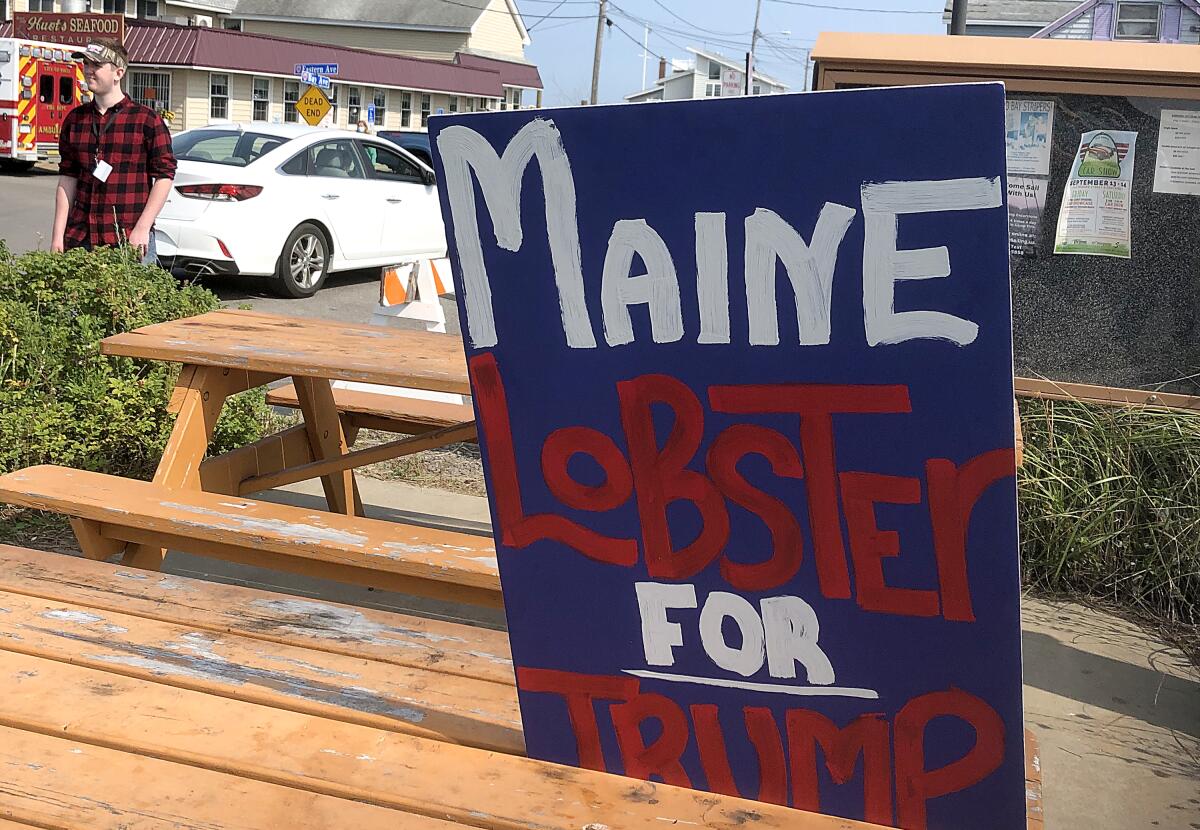
A boat docked recently on an island near Bar Harbor flew a pennant that read: “Trump 2020. F*** your feelings.” The fisherman who spoke at the GOP convention said one person threatened to boycott lobster from Swan’s Island to protest his supporting Trump.
Some lobstermen backing Biden say they don’t want to go public because they fear harassment. In Hampden, several Trump supporters complained to local police that someone had defaced their yard signs and left feces in their mailboxes.
The fight for Maine’s 2nd Congressional District seems personal to Trump. Its rural, predominantly white, blue-collar population, coupled with Mainers’ reputation for feisty independence, make this prime Trump country.
“You treated me very nicely in the last election,” he said when he traveled to the central Maine town of Guilford in June. “I needed the one point. Now I’d like to win the whole state.”
But the state overall leans Democratic. And GOP Sen. Susan Collins is in the toughest reelection fight of her 24-year career.
She’s a key figure in the partisan debate over when and how to fill the Supreme Court vacancy following the death of Justice Ruth Bader Ginsburg on Friday.
On Saturday, Collins — who is wooing swing voters she lost after backing Trump’s last high court nominee, Brett M. Kavanaugh — rejected the president’s call for the Senate to vote on a nominee of his choice.
Instead, Collins said the vacancy should be filled by the winner of the Nov. 3 presidential election.
Polls show Biden leading in Maine by double-digit margins. Even in the more-Republican 2nd District, surveys show a very close race.
Biden generally has been doing better than Hillary Clinton, the Democrats’ 2016 nominee, among white and older voters, and Maine is one of the whitest, oldest states in the country.
Trump supporters say the polls understate the president’s strength and an enthusiasm gap between his supporters and Biden’s.
“There’s definitely a silent majority in certain pockets, like in Bangor,” said Joshua Hiatt, a high school teacher who volunteered at a GOP campaign office on a crisp, sunny Saturday in Bangor. “But you go out through all of rural Maine and it’s Trump, Trump, Trump everywhere.”
Before fanning out to canvass — wearing masks and with instructions to maintain social distance after knocking on doors — volunteers got a pep talk from the Republican running for Congress against Democratic Rep. Jared Golden.
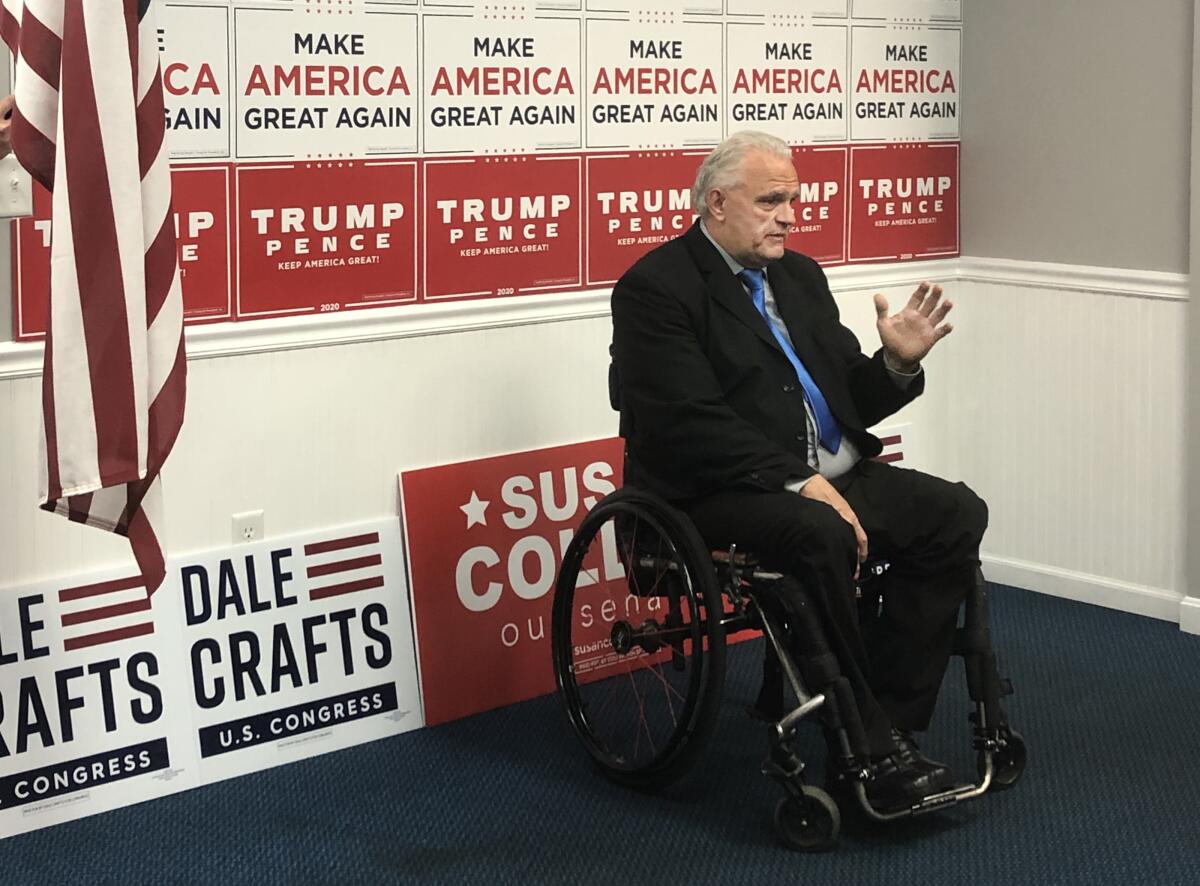
“I don’t care what anybody says or the polls say,” said Dale Crafts, a former Maine state legislator. “We’re going to win.... We’re going to get the president back. Look at the work he’s done here in Maine.”
Trump is focusing intently on the state’s iconic lobster industry, which has struggled during the pandemic.
Demand for the crustacean cratered with the shutdown of tourism in Maine, as well as cruise ship voyages and high-end restaurants across the country. But lobstermen were hurting even before the pandemic because Trump’s trade war with China decimated a huge export market.
U.S. lobster prices have plummeted to the lowest in at least four years after the spread of the coronavirus halted charter flights to Asia.
During his June visit to Maine, Trump promised financial relief for the seafood industry. In August, he reached an agreement with the European Union to lift tariffs on U.S. lobsters. In early September, the administration announced it would providing $530 million to fishermen hurt by foreign tariffs, including an estimated $50 million to Maine.
Those cash payments — of up to $250,000 — could cement loyalty among his backers and make it easier for others to swallow their reservations about the president.
“I think he’s a loudmouth,” said Nick Beaudoin, a lobsterman in Saco. “But I like what Trump has done for us.”
Trump critics say he is trying to claim credit for helping the seafood industry in a crisis that he created when he provoked a trade war with China.
“You throw the baby overboard, then you’re a hero if you save it,” said Sam Rosen, a lobsterman from Vinalhaven, who plans to vote for Biden.
Others felt little gratitude to Trump for the money coming their way.
“I don’t think it will switch votes,” said a fisherman who backs Biden but did not want to be named. “I’m going to spend my money locally and on Biden.”
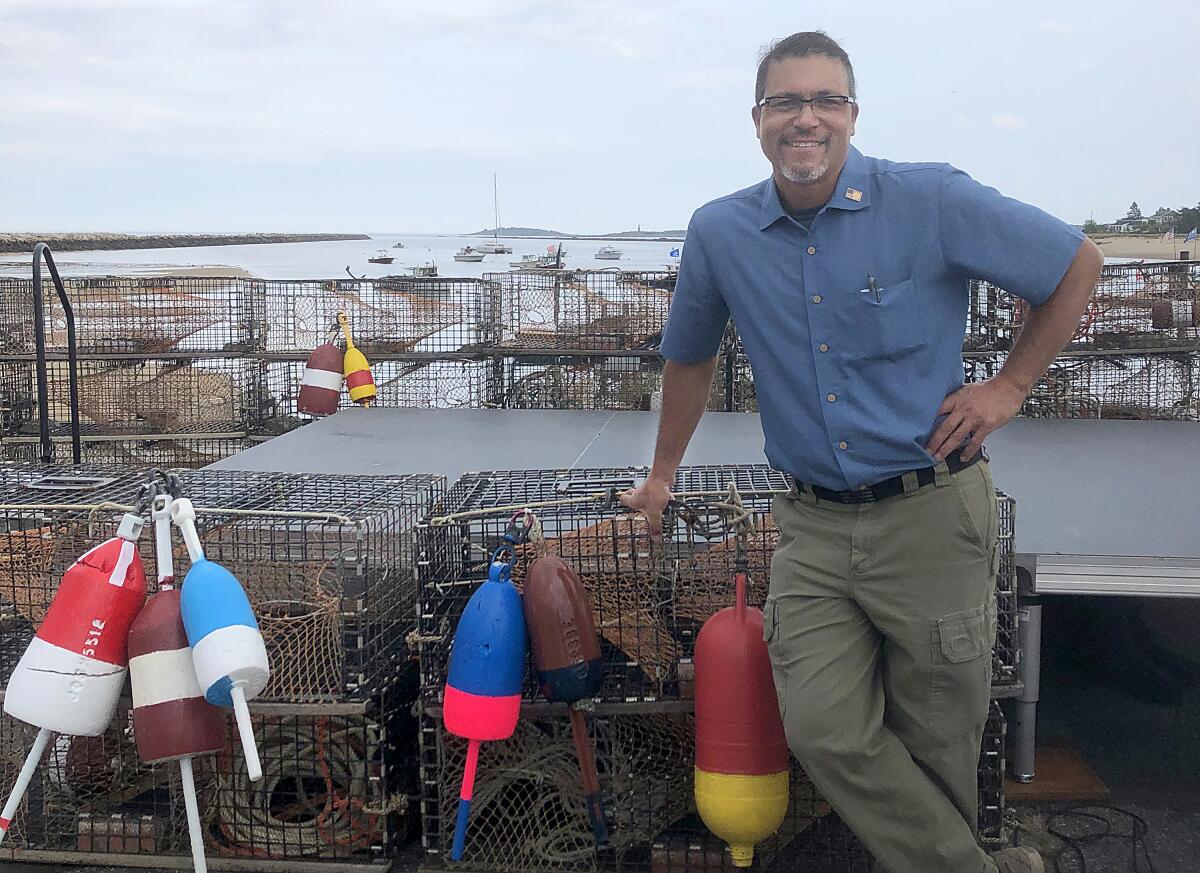
Jason Joyce, the Swan’s Island lobsterman who spoke at the GOP convention, said he didn’t vote for Trump in 2016 because he believed Trump, like Clinton, was “making stuff up.”
Joyce, a Christian conservative, now backs Trump because he says the president kept his promises to the industry and because he worries that Biden will side with environmentalists on policies that hurt lobstering.
“They will have a friend in the White House” if Biden wins, Joyce said in an interview. “Now we have a friend in the White House.”
Other Mainers are not feeling the benefit of Trump’s tariff relief policies.
Roque Bluffs blueberry farmer Lisa Hanscom said her 100-year-old blueberry farm has been hurt by tariffs, but that she has been given no financial relief. She was impressed when the Biden campaign reached out and invited blueberry farmers to join a campaign Zoom call.
“He hasn’t overlooked the blueberry farmer in the state of Maine and just focused on the lobster industry,” Hanscom said in an interview.
The Biden campaign has emphasized its “Buy America” economic message in a state where many industries have been buffeted by foreign competition.
“What I like about the vice president’s plan is it is based on experience,” said Kathie Leonard, a businesswoman from Auburn, speaking on a Biden campaign Zoom call. “He’s been in government for so long.’’
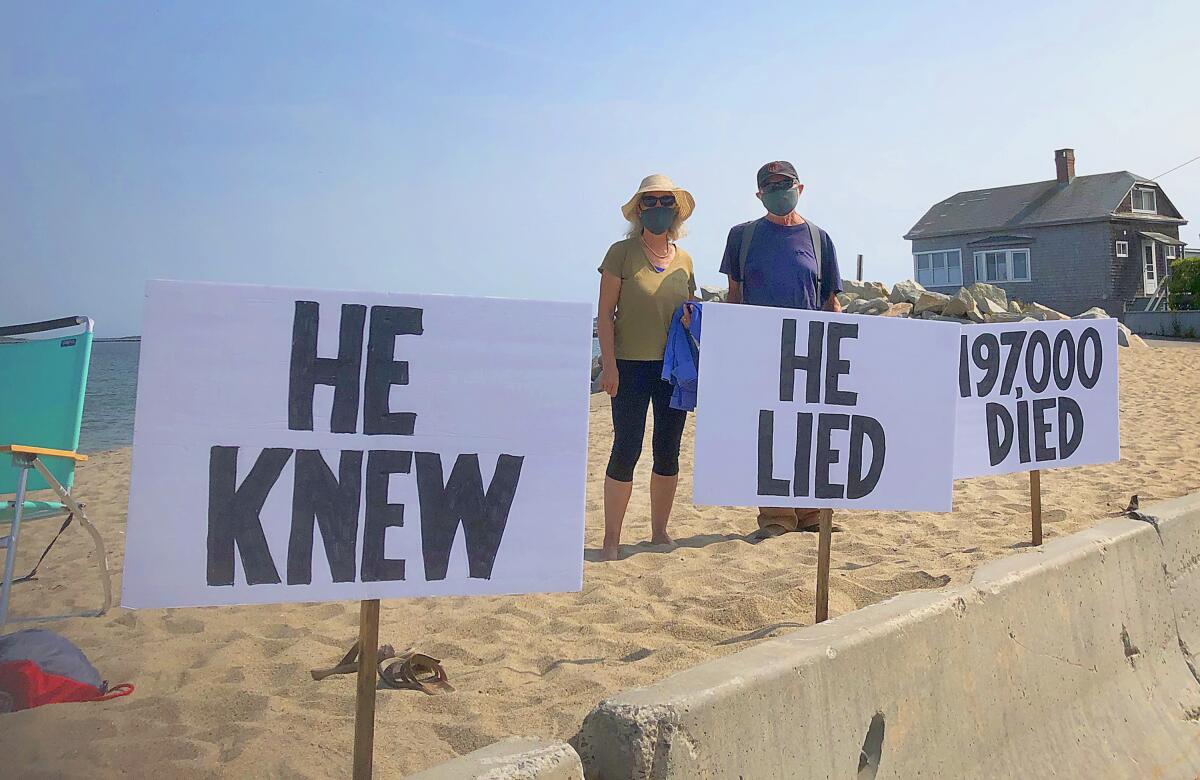
Unlike Trump, Biden has held no live rallies in Maine, because large gatherings pose a risk of spreading COVID-19.
Standing on a Saco beach with signs criticizing Trump’s handling of the pandemic, Democrats Tina Tarr and George Hughes protested the Eric Trump rally, which was held outdoors but attended by hundreds of mostly unmasked people.
The couple were glad Biden was not holding rallies, but worry that the party’s campaign may now be too low profile.
“Liberals are generally less boisterous about their opinions,” Hughes said. “Republicans are very vocal about supporting their side. I wish Democrats were more.”
More to Read
Get the L.A. Times Politics newsletter
Deeply reported insights into legislation, politics and policy from Sacramento, Washington and beyond. In your inbox three times per week.
You may occasionally receive promotional content from the Los Angeles Times.


